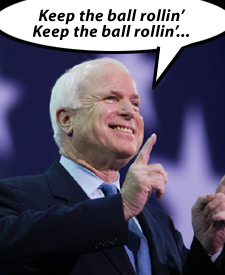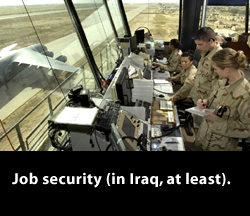Same old (x 2).
Heard a McCain foreign policy adviser on NPR's All Things Considered this week. (I suppose that's a bit  more relevant a news feature than the story about astronauts voting in space that ran a few days earlier on ludicrous Morning Edition.) The McCain guy had worked for prominent Republicans before, of course - namely Trent Lott and Donald Rumsfeld. That's right - Lott, the retrograde southern conservative politician who was so reflexively racist that he made a comment he couldn't back away from even in the wake of the G.O.P.'s 2002 congressional electoral victory... his foreign policy adviser. And, of course, Donald Rumsfeld, undoubtedly the most disastrous Defense Secretary since Robert McNamara (middle name: Strange)... How reassuring to know that McCain is getting the same advice Rummy enjoyed. So... what did this adviser to great minds have to say about the war in Iraq? Well, the NPR interviewer (Robert Siegel) stuck to narrow issues relating to the "metrics of success", as Rumsfeld might have put it. McCain's man bobbed and weaved a bit, saying we can start thinking about leaving when Al Qaeda is defeated. Asked how we would know when that had happened, he told Siegel they will be defeated when they are no longer a strategic threat. What does that mean in concrete terms? Ahem.
more relevant a news feature than the story about astronauts voting in space that ran a few days earlier on ludicrous Morning Edition.) The McCain guy had worked for prominent Republicans before, of course - namely Trent Lott and Donald Rumsfeld. That's right - Lott, the retrograde southern conservative politician who was so reflexively racist that he made a comment he couldn't back away from even in the wake of the G.O.P.'s 2002 congressional electoral victory... his foreign policy adviser. And, of course, Donald Rumsfeld, undoubtedly the most disastrous Defense Secretary since Robert McNamara (middle name: Strange)... How reassuring to know that McCain is getting the same advice Rummy enjoyed. So... what did this adviser to great minds have to say about the war in Iraq? Well, the NPR interviewer (Robert Siegel) stuck to narrow issues relating to the "metrics of success", as Rumsfeld might have put it. McCain's man bobbed and weaved a bit, saying we can start thinking about leaving when Al Qaeda is defeated. Asked how we would know when that had happened, he told Siegel they will be defeated when they are no longer a strategic threat. What does that mean in concrete terms? Ahem.
I think the general assumption is that the administration and other hawks don't want to nail down what victory in Iraq looks like because the issues involved are far too complex to be reduced to such a simple formulation (i.e. only 3 car bombings a year means we've won!). I think the truth is they don't want to talk about it because they have no intention of ever leaving Iraq. There is simply no point in discussing it as far as they are concerned. The notion of staying in Iraq permanently is deeply unpopular with the American public, so it doesn't make a good talking point. Instead, they need to resort to blather about "kinetic" power and force projection capabilities, blah-blah-blah, so that people's eyes will glaze over before they catch on that what's really being discussed here is the architecture of a very, very long-term U.S. presence in country. Of course, this propensity is not limited to McCain's people or the G.O.P. as a whole - I recently heard the New York Times Baghdad bureau chief talking about how 60 U.S. bases in Iraq isn't all that many, really. (Oh, sure... 60's nothing, unless you're talking about Iranian bases in, say, Mexico.)
 Five years into the occupation there is a strong institutional disposition toward maintaining the Iraq enterprise. While the Republicans express this in terms of continuing the current policy, in essence, the Democrats will talk about a residual force to protect the massive U.S. embassy (forbidden city, really), train Iraqi soldiers and police, and "fight terrorism" in case al Qaeda raises its profile again. That's what the Obama camp is saying - not exactly a radical departure. This isn't anything new, of course. The U.S. presence in Vietnam involved a substantial institutional investment that almost no American politician wanted to completely back away from. (The French colonial experience in Vietnam perhaps even more so.) So don't think pulling the lever for the O-man is going to end this war. The war will end only when we insist upon:
Five years into the occupation there is a strong institutional disposition toward maintaining the Iraq enterprise. While the Republicans express this in terms of continuing the current policy, in essence, the Democrats will talk about a residual force to protect the massive U.S. embassy (forbidden city, really), train Iraqi soldiers and police, and "fight terrorism" in case al Qaeda raises its profile again. That's what the Obama camp is saying - not exactly a radical departure. This isn't anything new, of course. The U.S. presence in Vietnam involved a substantial institutional investment that almost no American politician wanted to completely back away from. (The French colonial experience in Vietnam perhaps even more so.) So don't think pulling the lever for the O-man is going to end this war. The war will end only when we insist upon:
- a complete withdrawal of our military and associated contractors from Iraq;
- dismantling and abandoning the bases we've built over the past five years;
- using some of the money NOT spent on the occupation to help Iraqis put their country back together again (to the extent that that's possible).
Basically the McGovern-Polk plan, which neither party endorses. Same old same old.
Whoever wins this fall, we will need to push for an end to this war... and push harder than any of us might have thought necessary. Otherwise it will continue, with grim consequences we have to fully realize.
luv u,
jp
Comments